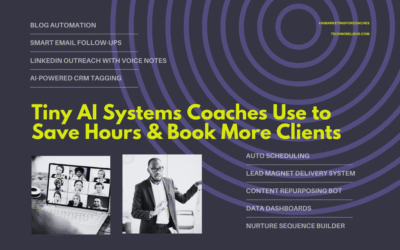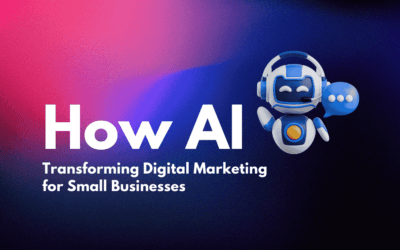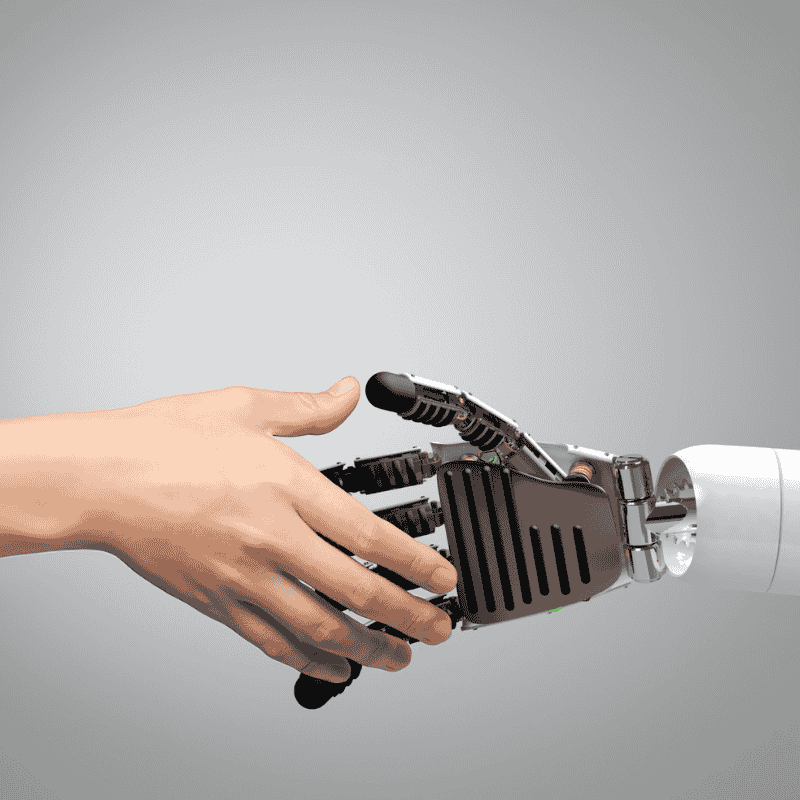In the rapidly evolving landscape of digital marketing, AI marketing automation has emerged as a game-changer for businesses of all sizes, particularly small enterprises. At its core, AI marketing automation refers to the use of artificial intelligence technologies to streamline and enhance marketing processes. This includes automating repetitive tasks, analyzing customer data, and personalizing marketing messages to improve engagement and conversion rates.
As we step into 2025, the significance of AI marketing automation cannot be overstated, especially for small businesses striving to compete in a crowded marketplace. The integration of AI into marketing automation allows small businesses to leverage data-driven insights that were once only accessible to larger corporations with extensive resources.
This not only saves time and resources but also enhances the overall effectiveness of marketing campaigns, making it an essential tool for small business owners looking to maximize their impact.
Key Takeaways
- AI marketing automation uses artificial intelligence to streamline and optimize marketing processes
- Small businesses can benefit from AI marketing automation by saving time and resources
- AI marketing automation can improve customer engagement through personalized and targeted communication
- Choosing the right marketing automation tools is crucial for small businesses to effectively implement AI strategies
- Implementing AI marketing automation requires careful planning and integration with existing systems and processes
The Benefits of AI Marketing Automation for Small Businesses
Time and Cost Savings
One of the most significant advantages of AI marketing automation for small businesses is the ability to save time and reduce operational costs. By automating routine tasks such as email marketing, social media posting, and lead scoring, small business owners can focus on more strategic initiatives that drive growth. This efficiency allows them to allocate their limited resources more effectively, ensuring that they can compete with larger companies without stretching their budgets.
Personalized Experiences at Scale
Moreover, AI marketing automation provides small businesses with the capability to deliver personalized experiences at scale. With advanced segmentation and targeting features, businesses can tailor their messaging based on customer behavior, preferences, and demographics. For instance, a local bakery could use AI tools to send personalized offers to customers who frequently purchase specific items, thereby increasing the likelihood of repeat business.
Enhanced Customer Satisfaction and Loyalty
This level of personalization not only enhances customer satisfaction but also fosters brand loyalty, which is crucial for small businesses aiming to build a strong customer base.
How AI Marketing Automation Can Improve Customer Engagement

Customer engagement is a critical component of any successful marketing strategy, and AI marketing automation plays a pivotal role in enhancing this aspect for small businesses. By utilizing AI-driven insights, businesses can create more relevant and timely content that resonates with their audience. For example, an online clothing retailer could analyze customer purchase history and browsing behavior to recommend products that align with individual preferences, leading to higher engagement rates.
Additionally, AI marketing automation enables small businesses to interact with customers in real-time through chatbots and automated messaging systems. These tools can provide instant responses to customer inquiries, guiding them through the purchasing process or addressing concerns without the need for human intervention. This not only improves the customer experience but also frees up staff time for more complex tasks.
As a result, small businesses can maintain a high level of engagement while managing their resources effectively.
Choosing the Right Marketing Automation Tools for Your Small Business
Selecting the right marketing automation tools is crucial for small businesses looking to implement AI marketing automation successfully. With a plethora of options available in the market, it’s essential to consider factors such as ease of use, scalability, and integration capabilities. Small business owners should look for platforms that offer user-friendly interfaces and robust support resources to ensure a smooth onboarding process.
For instance, if a small business aims to enhance its email marketing efforts, it should prioritize platforms that offer advanced email automation features and analytics capabilities. Additionally, considering budget constraints is vital; many marketing automation tools offer tiered pricing plans that cater to different business sizes and needs.
By carefully evaluating these factors, small businesses can select the right tools that will empower them to harness the full potential of AI marketing automation.
Implementing AI Marketing Automation Strategies
Once the right tools have been selected, the next step is implementing effective AI marketing automation strategies. This process begins with defining clear objectives and key performance indicators (KPIs) that align with overall business goals. For example, a small e-commerce store might set objectives such as increasing website traffic by 30% or boosting email open rates by 20% within a specific timeframe.
After establishing goals, small businesses should focus on creating targeted content that resonates with their audience. Utilizing AI-driven insights can help identify trending topics and customer preferences, allowing businesses to craft compelling messages that drive engagement. Additionally, segmenting the audience based on behavior and demographics enables more personalized communication, which is essential for maximizing the impact of marketing efforts.
Moreover, continuous testing and optimization are vital components of successful implementation. Small businesses should regularly analyze campaign performance data to identify areas for improvement and adjust strategies accordingly. By adopting an agile approach to marketing automation, businesses can refine their tactics over time and achieve better results.
Measuring the Success of AI Marketing Automation Campaigns

Tracking Key Performance Indicators
By tracking these metrics over time, businesses can gain valuable insights into what works and what doesn’t. This enables them to refine their strategies and optimize their campaigns for better results.
Leveraging Analytics Tools
Utilizing analytics tools provided by marketing automation platforms can simplify this process significantly. These tools often offer comprehensive dashboards that visualize key performance indicators in real-time, allowing small business owners to monitor campaign performance at a glance.
Gathering Qualitative Insights
Additionally, gathering feedback from customers can provide qualitative insights that complement quantitative data. Surveys or follow-up emails can help businesses understand customer satisfaction levels and identify areas for improvement. By combining both quantitative and qualitative data, small businesses can develop a holistic view of their marketing efforts and make data-driven decisions that enhance future campaigns.
Overcoming Challenges in AI Marketing Automation for Small Businesses
While the benefits of AI marketing automation are substantial, small businesses may encounter several challenges during implementation. One common hurdle is the initial investment required for technology adoption. Many small business owners may feel hesitant about allocating budget towards new tools when resources are already limited.
However, it’s important to view this investment as a long-term strategy that can yield significant returns through increased efficiency and improved customer engagement. Another challenge lies in the complexity of data management. Small businesses often struggle with collecting and analyzing large volumes of data effectively.
To overcome this obstacle, it’s crucial to prioritize data quality over quantity. Focusing on collecting relevant data points that directly inform marketing strategies can streamline analysis efforts and lead to more actionable insights. Training staff on new technologies is also essential for successful implementation.
Small business owners should invest time in educating their teams about how to use AI marketing automation tools effectively. This may involve hosting training sessions or providing access to online resources that help employees become proficient in utilizing these technologies.
The Future of AI Marketing Automation for Small Businesses
As we look ahead to the future of AI marketing automation in 2025 and beyond, it’s clear that this technology will continue to evolve and shape the way small businesses operate. With advancements in machine learning and natural language processing, we can expect even more sophisticated tools that offer deeper insights into customer behavior and preferences. Moreover, as consumer expectations continue to rise, personalization will become increasingly important in marketing strategies.
Small businesses that embrace AI marketing automation will be better equipped to deliver tailored experiences that resonate with their audience on a personal level. This will not only enhance customer satisfaction but also foster long-term loyalty. In conclusion, embracing AI marketing automation is no longer just an option for small businesses; it’s a necessity in today’s competitive landscape.
By understanding its benefits, implementing effective strategies, and measuring success diligently, small business owners can harness the power of AI to drive growth and engagement. If you’re ready to take your marketing efforts to the next level, consider exploring AI marketing automation tools today—your future self will thank you!
If you are interested in learning more about how AI can revolutionize your marketing strategies, you may want to check out this article on SEO. Search engine optimization is a crucial aspect of digital marketing, and incorporating AI into your SEO efforts can help you stay ahead of the competition. By leveraging AI technology, you can improve your website’s visibility and drive more organic traffic to your site.
Get a Free Customized AI Marketing Strategy
FAQs
What is AI marketing automation?
AI marketing automation refers to the use of artificial intelligence technology to automate marketing processes and tasks. This can include tasks such as customer segmentation, personalized messaging, lead scoring, and campaign optimization.
How does AI marketing automation benefit small businesses?
AI marketing automation can benefit small businesses by helping them to streamline their marketing efforts, improve efficiency, and deliver more personalized and targeted marketing campaigns. This can lead to better customer engagement, increased sales, and a higher return on investment.
What are some common AI marketing automation tools for small businesses?
Common AI marketing automation tools for small businesses include customer relationship management (CRM) systems with AI capabilities, email marketing platforms with AI-powered personalization, and social media management tools with AI-driven analytics and scheduling features.
Is AI marketing automation cost-effective for small businesses?
While the initial investment in AI marketing automation tools may seem daunting for small businesses, the long-term benefits in terms of time savings, improved targeting, and increased sales can make it a cost-effective solution. Additionally, many AI marketing automation tools offer pricing plans tailored to small businesses.
How can small businesses get started with AI marketing automation?
Small businesses can get started with AI marketing automation by first identifying their marketing goals and pain points. They can then research and select AI marketing automation tools that best fit their needs and budget. It’s also important to invest in training and support to ensure successful implementation and use of these tools.






0 Comments